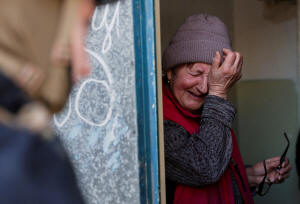Blood and billions: the cost of Russia's war in Ukraine
 Send a link to a friend
Send a link to a friend
 [August 23, 2023]
By Guy Faulconbridge [August 23, 2023]
By Guy Faulconbridge
(Reuters) - Russia's invasion of Ukraine has left tens of thousands of
dead, displaced millions and sown economic turmoil across the world in
the 18 months since its launch on Feb. 24, 2022.
Here are some details of the impact:
* DEATH
The war has caused death on a level not seen in Europe since World War
Two.
More than 9,000 civilians had been recorded as killed and more than
16,000 injured by the end of July, according to the United Nations High
Commissioner for Human Rights (OHCHR), which said it believed the actual
figures were considerably higher.
The war has left nearly 500,000 troops either dead or injured, according
to the New York Times.
The paper cited officials from the United States, which supports
Ukraine, as saying as many as 120,000 Russian troops have been killed
and 170,000 to 180,000 injured, with Ukraine's military toll at 70,000
killed and 100,000 to 120,000 wounded.
Russian officials say U.S. estimates of Russian losses are far too high
- and propaganda. Russian Defence Minister Sergei Shoigu said on Sept.
21 that 5,937 Russian soldiers had been killed since the start of the
war. No further updates have been given and losses are a state secret.

Ukraine has not said how many of its soldiers have been killed and says
its military losses are a state secret as they affect battlefield
tactics.
Reuters is unable to verify the toll on either side.
The conflict in eastern Ukraine began in 2014 after a pro-Russian
president was toppled in Ukraine's Maidan Revolution and Russia annexed
Crimea, with Russian-backed forces fighting Ukraine's armed forces.
About 14,000 people were killed there between 2014 and the end of 2021,
according to the OHCHR, including 3,106 civilians.
* DISPLACEMENT
Since the 2022 invasion, millions of Ukrainians have been forced from
their homes, the United Nations refugee agency has said. Ukraine has a
population of more than 41 million.
An estimated 17.6 million people in Ukraine require urgent humanitarian
support, including more than 5 million people internally displaced by
the war, the UNHCR said.
There are over 5.9 million refugees from Ukraine recorded across Europe,
according to the agency's data.
* UKRAINE
Russia has taken 11% of Ukraine's territory since the start of the war,
an area equivalent to Massachusetts, New Hampshire and Connecticut
combined, according to the Belfer Center at the Harvard Kennedy School.
When added to Crimea, which Russia annexed from Ukraine in 2014, Russia
now controls about 17.5% of Ukraine, an area of about 41,000 square
miles (106,000 square km).

After pushing back Russian forces in 2022, it has failed to make major
inroads against well-dug in Russian troops since launching a new
counteroffensive in early June.
Ukraine has lost a swathe of its coastline, its economy has been
crippled and some cities have been turned into wastelands by the
fighting.
Ukraine's economy contracted by 30% in 2022 and is forecast to grow by
of 1% to 3% this year, according to the International Monetary Fund.
It is unclear how much Ukraine has spent on the fighting.

[to top of second column]
|

A resident gestures in the bombed-out
town of Chasiv Yar, on her unwillingness to leave and evacuate her
home, near the frontline, as Russia's invasion of Ukraine continues,
in the eastern region of Donetsk, Ukraine, April 2, 2023. REUTERS/Violeta
Santos Moura/File Photo

* RUSSIA
Russia's expenditure on the war is a state secret, but it coincides
with a major shock to the Russian economy from the toughest ever
Western sanctions imposed after the invasion.
The economy defied early expectations for a double-digit contraction
in 2022, but a return to prosperity remains a long way off as the
government directs more spending towards the military.
Russia's economy will grow 1.5% this year, according to the
International Monetary Fund, after a contraction of 2.1% in 2022.
"In the medium term, the Russian economy will be hampered by the
departure of multinationals, the loss of human capital, its
disconnection from global financial markets, a reduction in its
policy buffers," IMF spokeswoman Julie Kozack said last month.
"And therefore, we do expect over the medium term that output in
Russia will be 7 percent lower than the pre-war forecast."
Russia has doubled its 2023 defence spending target to more than
$100 billion - a third of all public expenditure - a government
document reviewed by Reuters showed, as the costs of the war in
Ukraine spiral and place growing strain on Moscow's finances.
As Russia's military spending soars and sanctions squeeze its energy
revenues, Moscow faces a battle to keep its budget deficit in check.
Russia has lost a major chunk of the European gas market but has
been able to keep selling its oil to global markets, although the
United States, Europe and other powers have limited or ended their
purchases.
It has been excluded from Western financial markets, most of its
oligarchs are sanctioned, and it is experiencing problems sourcing
some items such as microchips.

CIA Director William Burns said earlier this year that Putin risked
turning Russia into "an economic colony of China over time".
Russia has defaulted on its foreign bonds for the first time since
the calamitous months following the 1917 Bolshevik revolution.
* PRICES
The invasion and Western sanctions on Russia led to steep rises in
the prices of fertiliser, wheat, metals and energy, fuelling an
inflationary wave and a global food crisis.
Russia is the world's second largest oil exporter after Saudi Arabia
and the world's biggest exporter of natural gas, wheat, nitrogen
fertiliser and palladium.
Shortly after Russia's invasion of Ukraine, international oil prices
spiked to their highest levels since the records of 2008.
* WESTERN WEAPONS
Since the invasion, the United States has committed more than $43
billion in security assistance to Ukraine, including stinger
anti-aircraft systems, Javelin anti-armour systems, 155mm Howitzers
and equipment to protect against chemical, biological, radiological
and nuclear attack.
The biggest overall supporters of Ukraine in nominal terms are the
United States, the European Union, Britain, Germany and Japan,
according to The Kiel Institute for the World Economy.
Russia says the West's weapons supplies are escalating the war.
(Reporting by Guy Faulconbridge; editing by Philippa Fletcher)
[© 2023 Thomson Reuters. All rights
reserved.]This material may not be published,
broadcast, rewritten or redistributed.
Thompson Reuters is solely responsible for this content. |